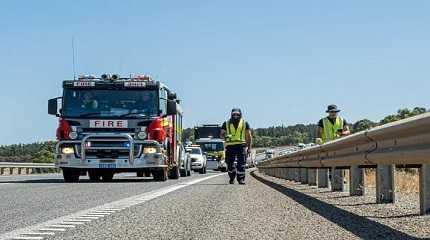
SYDNEY. Feb. 1 (Xinhua) -- Authorities in the Western Australia state (WA) confirmed that the tiny silver capsule, which contained the radioactive substance Caesium-137, was found and safely controlled at about 11:00 a.m. local time on Wednesday.
"We successfully retrieved the radioactive capsule after searching hundreds of kilometers in the outback and the metro area over the last six days. The capsule was located just south of Newman on the Great Northern Highway. It was two meters from the side of the road," said Darren Klemm, Fire and Emergency Services commissioner.
Klemm told reporters that the vehicle was traveling at 70 km/h when specialist equipment picked up radiation emitted from the capsule, and the search team then used portable detection equipment to locate the capsule.
"The Australian Defence Force is currently verifying the capsule using its serial number. A 20-meter hot zone has been set up around the capsule and it will be placed into a lead container to shield from radiation. It will be stored in a secure location in Newman tonight before being transported to a WA Health Facility in Perth tomorrow," Klemm said.
Authorities had warned that the capsule posed a significant public health risk, warning that anyone who came too close or touched it without protection could suffer from radiation burns or sickness.
"Once the capsule has been secured, we will survey the site to ensure there is no contamination in the surrounding area," said Klemm.
"In extremely unlikely circumstance that the capsule leaks we will remediate the area."
Following that, the emergency services updated its public warning, saying that the radioactive substance in parts of Pilbara, Midwest Gascoyne, Goldfields-Midlands and Perth Metropolitan regions is controlled and contained.
According to the emergency department, the 6 mm by 8 mm capsule was packaged on Jan. 10 to be sent to Perth for repair before leaving the site for transport by road on Jan. 12.
The package holding the capsule arrived in Perth on Jan. 16 and was unloaded and stored in the licensed service provider's secure radiation store.
On Jan. 25, the gauge was unpacked for inspection. Upon opening the package, it was found that the gauge was broken apart with one of the four mounting bolts missing and the source itself and all screws on the gauge also missing.
Mining company Rio Tinto on Sunday apologized for losing the capsule and launched an investigation over the incident.
"We are taking this incident very seriously. We recognize this is clearly very concerning and are sorry for the alarm it has caused in the Western Australian community," said Rio Tinto Iron Ore Chief Executive Officer Simon Trott.
In an article published in the Conversation, Edward Obbard, senior lecturer in nuclear engineering from the University of New South Wales, noted that Caesium-137 is a dangerous but useful radioactive isotope that spits out electrons (or beta radiation) and high-energy photons (or gamma radiation), which can be used in some cancer treatments, for measuring the thickness of metal or the flow of liquids, and for calibrating radiation gauges.
The missing capsule has a radioactive load of 19 giga-becquerels, which means it emits about 19 billion high-energy photons per second, said the scholar, warning that the most danger would occur if the capsule was broken open.
"Caesium-137 has a half-life of just over 30 years, which means the source's radiation output will halve every 30 years until it disappears completely," said Obbard.




